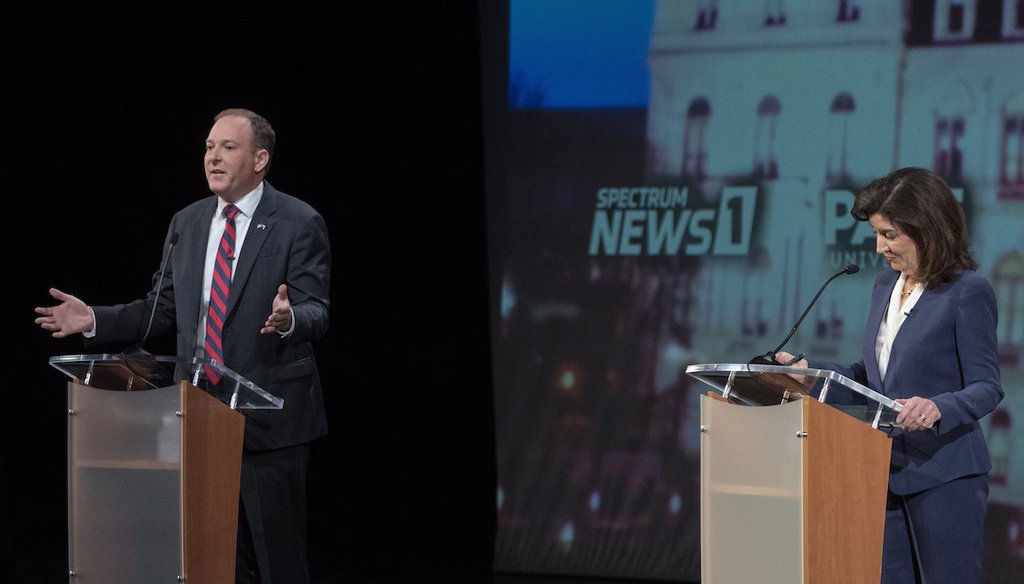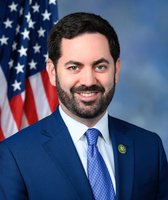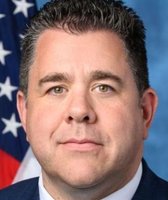Stand up for the facts!
Our only agenda is to publish the truth so you can be an informed participant in democracy.
We need your help.
I would like to contribute

Republican candidate for New York Governor Lee Zeldin, left, participates in a debate against incumbent Democratic Gov. Kathy Hochul hosted by Spectrum News NY1, Oct. 25, 2022, at Pace University in New York. (AP)
If Your Time is short
- New York did lose more population than other states between 2020 and 2021, as Zeldin claimed.
- New York's abortion rights law from 2019 codified protections contained in Roe v. Wade, as Hochul claimed.
In the only debate in the race for New York governor, incumbent Kathy Hochul and Rep. Lee Zeldin offered plenty of claims and counterclaims.
Zeldin, a Republican from Long Island, focused on crime, the Buffalo Bills stadium deal, and state's population loss, while Hochul, an Erie County Democrat, highlighted Zeldin’s friendly relationship with former President Donald Trump, his votes against certifying the 2020 presidential election results in Arizona and Pennsylvania, and his anti-abortion rights views.
We fact-checked some of their claims from the Oct. 25 debate.
Zeldin: New York leads the nation in population loss.
This is accurate, according to Pew, a nonpartisan research organization.
"New York lost 319,000 people since mid-2020, a decline of 1.58%, the most of any state. That’s primarily because many residents left New York for other states," Pew wrote. Seventeen states lost residents between July 2020 and July 2021. New York was followed by Illinois, Hawaii and California, the latter three all losing under 1% of their populations. Meanwhile, other Northeast states -- Connecticut, Maine, Vermont and New Hampshire -- gained residents.
Hochul: We changed bail reform laws so that repeat offenders and people with gun offenses will be treated as they were under the old law.
The claim about repeat offenders generally covers people accused of harming people or damaging property, or who have been charged with criminal gun possession, according to Krystal M. Rodriguez, policy director with the Data Collaborative for Justice at John Jay College of Criminal Justice. However, in general, people who are charged more than once with charges that do not concern harm to people or property, such as simple drug possession cases, are not affected by recent changes to the law.
The amendments that went into effect on July 2, 2020, included a provision that someone with a pending case over a charge that includes harming a person or property and the new charge also includes harming a person or property, a judge can require cash bail before releasing the defendant before disposition of the new case. In 2022, Hochul pressed further changes, so that even in a pending case in which the defendant hadn't been arraigned yet, such as in cases where a desk appearance ticket is issued, the case can be counted as pending if an arrest was made on a charge that included harm to a person or property. Hochul also added criminal possession of a firearm, which doesn’t technically involve harm to a person, as a bail-eligible charge if either the current or pending charges includes that offense.
The recent amendments added more gun offenses to the list of charges in which a judge can impose bail before releasing a defendant. However, Hochul’s claim could imply that judges were previously precluded from requiring bail before releasing someone on gun charges before the recent changes, Rodriguez said. In New York City, criminal possession of a weapon in the second degree is the gun possession charge most often charged in gun cases, and judges always had the discretion to require a defendant post bail before being release before disposition of the case. That’s because it is classified as a violent felony offense, and initial changes to the bail law in 2019 allowed judges to require bail before release, she said.
Hochul’s amendments added gun possession offenses in which judges are allowed to impose bail before releasing a defendant, such as criminal possession of a weapon on school grounds, criminal possession of a weapon in the third degree, and criminal sale of a firearm to a minor.
Hochul: Zeldin voted against the infrastructure bill and the Inflation Reduction Act.
This is accurate. Zeldin voted against the infrastructure bill and the Inflation Reduction Act. He said the Inflation Reduction Act spends money the country can’t afford.
Zeldin: New York state paid twice as much for COVID tests as California because Hochul gave a no-bid contract to Digital Gadgets, whose owner is a major donor.
California paid 45% less per test than New York did. In New York, the tests were purchased through Digital Gadgets, a company whose owner can be connected to $300,000 in donations to Hochul’s campaign, according to the Times-Union in Albany. The tests were purchased when the state’s competitive bidding process had been suspended. Hochul said the state needed tests for children to go back to school after a winter break when the omicron variant was spreading. New York purchased the tests at a time when they were in scarce supply, about three weeks before California’s order was placed. Hochul and the company have denied the political donations had anything to do with the purchase agreement. Though California paid far less for the same tests, the newspaper found a municipality in Massachusetts that paid slightly more than New York did.
Hochul: On New York’s abortion law: "What we have in New York State is simply a codification of Roe v. Wade."
Fact-checks and other reporting on the Reproductive Health Act of 2019 found the state put in place a law consistent with the decision in Roe v. Wade. Lawmakers acted in anticipation the landmark Supreme Court case could be overturned. New York’s law at the time supplanted another law that only allowed abortions after 24 weeks if the mother’s life was at risk, but did not take into consideration her health, an important legal distinction, or if the fetus is not viable.
Zeldin: I voted to overturn the 2020 presidential election results from two states, Pennsylvania and Arizona, and did so because the Constitution says that state legislatures set the administration of election law.
After the riot in the U.S. Capitol on Jan. 6, 2021, Zeldin voted to overturn the results of the election from two states, Pennsylvania and Arizona. He said that those states didn’t follow the Constitution because changes to election administration were made by people who weren’t state legislators. Those states were also battleground states where President Joe Biden won, surprising Trump supporters.
The courts have rejected this argument from Zeldin and other Republicans, PolitiFact reported. Furthermore, experts said that election officials have designated authority to fill in the gaps in existing election law, and that every change in election administration must not go through state legislatures. Zeldin’s claim "draws on a legal doctrine based on a strict reading of Article 2 of the Constitution. But it ignores that courts have shut the door on challenges based on his argument, made in dozens of lawsuits by Donald Trump and his allies seeking to invalidate certified election results. It also ignores that some election officials have powers to set rules without legislative changes, especially during emergencies," PolitiFact wrote.
Our Sources
See links in article.














































